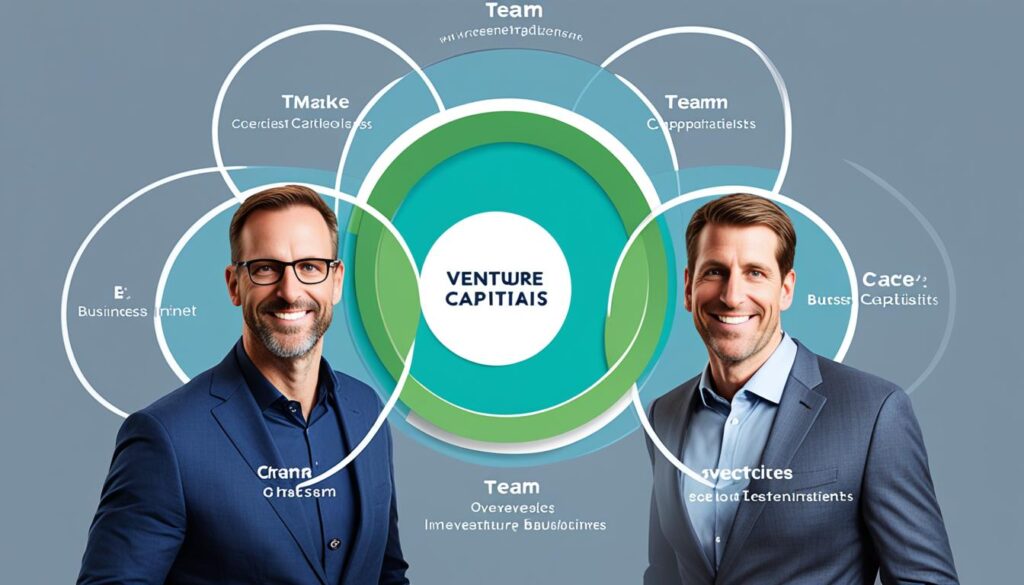Are you working on a startup or a new business idea? If so, you might have thought about getting venture capital (VC) funding. This funding can give your business the boost it needs to grow. However, not everyone can get this kind of financial support. This article will look into what it takes to secure venture capital. It aims to help you figure out whether this path is right for your business.
Venture capital is a topic that seems hidden from plain sight. It makes people ask, Can anyone get venture capital? This question challenges the idea that all startups can easily get money from venture capitalists. As we explore this question, you’ll learn how VC investors pick companies to support. You’ll also find out how to better your chances of getting VC funding.
Key Takeaways
- Venture capital is a highly sought-after source of financing for startups and growing businesses.
- Not everyone can access venture capital due to the selective nature of VC investors.
- Innovativeness, market potential, and scalability are crucial factors that VC firms consider when evaluating investment opportunities.
- Developing a comprehensive business plan and effectively pitching to investors are essential steps in securing VC funding.
- While venture capital may not be accessible to all, there are alternative funding options available for entrepreneurs.
Demystifying Venture Capital
Venture capital is money investors give to new or growing companies. These investors can be rich people or companies. Venture capitalists handle this money. They look for cool businesses to put it in. They bring cash and also know-how, connections, and advice to help these businesses grow.
What is Venture Capital?
Venture capital gives startups and growing companies a boost. It’s a form of private investing. With this cash, businesses can grow fast. Venture capital investors get a share of the company in return. This means they can share in the company’s success as it grows.
The Role of Venture Capitalists
Venture capitalists are key in the startup world. They offer cash and help. This help can be advice, connections, and even coaching. They really know their stuff about markets and trends. They use this knowledge to find businesses that can do well and support them.
| Key Characteristics of Venture Capital | Benefits for Startups |
|---|---|
|
|
“Venture capitalists are not just investors; they are partners who can help startups navigate the challenges of growth and scaling.”
Learning about venture capital and venture capitalists can help entrepreneurs. They can see if this financial help is right for their business. Then, they can figure out how to work with these investors.
Evaluating Your Business Idea

Your business idea must be innovative to attract venture capital. It should show you can grow a lot and meet needs not yet fulfilled. Venture capitalists will look closely at your idea to see its potential for significant growth. They will examine your product or service and your plans to expand.
Innovation and Market Potential
Your innovative business idea must be unique and meet a big market need. You need to show how your offering is different and why people will want it. Venture capitalists are interested in products or services that can become popular quickly.
Scalability and Growth Projections
Venture capitalists care about how big your business can get in the future. They want to see clear plans for growth that include how you will use technology and financial planning. Show them how your business can make a lot of money for them.
Building a Solid Business Plan

When looking for venture capital, a strong
business plan
is a must. It acts as a guide for your business, letting investors see your big picture. It shows them why your idea is a smart choice for their money.
Executive Summary
The
executive summary
plays a key role in your plan. It gives a brief but clear look at what your business is about. This part highlights why your business is a great opportunity, like its value to customers and expected profits.
Financial Projections
Convincing
financial projections
are vital for getting capital. They should cover income, spending, and money movement. Doing this shows you have a solid grip on your business’s money side.
Marketing and Sales Strategies
Your
marketing and sales strategies
are crucial too. It’s not just about getting customers but also keeping them. Your plan should detail how you will sell your product and grow your income. This is key to achieving your business goals.
If you have a great
business plan
, you set yourself up well to attract investors. With your document, you can show you’re ready for venture capital and boost your success chances.
Networking and Pitching to Investors

Building a strong network and pitching to investors are vital for startup funding. Use your connections and meet new people to find those who might invest in your business.
Leveraging Your Professional Network
Use your connections with colleagues and mentors to find investors. Go to events and meet people to make new connections. Get to know investor relations experts; they can help you meet the right investors for your VC fundraising.
Crafting a Compelling Pitch Deck
Creating a pitch deck that stands out is key. It should show how your business is special and why it can grow. Make sure it’s clear, looks good, and meets what investors are looking for.
Can anyone get venture capital?

Getting venture capital funding might seem exciting, but it’s not easy. Venture capitalists follow strict rules and are very picky. They focus on unique business ideas, strong teams, and how fast a company can grow.
Your business needs to show it’s unique, can reach a big market, and grow quickly to catch VC’s eyes. They want to invest in game-changers. If your idea doesn’t fit, getting VC funding will be tough.
Not all entrepreneurs have the same shot at VC investment. Things like the industry you’re in, where you’re located, and who you know matter. They also need a solid business plan, detailed finances, and a great pitch.
If venture capital isn’t an option for you, don’t worry. There are other ways to fund your startup or business. Consider bootstrapping, crowdfunding, or seeking help from angel investors and incubators. Each has pros and cons. It’s vital to know your options and choose what’s best for your business.
Understanding Investor Criteria

When you’re looking for venture capital (VC) funding, it’s vital to know what investors look for. They focus on several areas, especially the management team’s strength, the company’s unique assets, and its edge in the market. This evaluation helps investors decide if your company is a good fit for their funds.
Team and Management Experience
Venture capitalists think having the right team is critical. They check the management team’s background and skills, wanting to see a strong ability to lead and solve problems. A team that has proven its ability to grow a company can really impress investors.
Intellectual Property and Competitive Advantage
Having strong intellectual property (IP) is also major for VC investors. This can be in the form of patents, trademarks, or unique technology. Companies with solid IP have a better chance at long-term success. So, it’s important to show what makes your IP valuable and different. Doing so can help your company shine.
Knowing what investors care about is vital for your business’s success in getting VC funds. Tell a clear story that shows your team’s strength, the value of your IP, and what makes your company stand out. This can make investors more likely to support your venture’s growth.
Alternative Funding Options

Not everyone can access venture capital. However, startups and growing businesses can explore various alternative funding options. These include bootstrapping, crowdfunding, angel investors, and incubator programs. It’s key to look at each option’s pros and cons to find what’s best for your business.
Bootstrapping means you use your own money, business earnings, or loans from family and friends. This way, you keep full control but may limit your business’s growth. Crowdfunding on sites like Kickstarter lets you get many small investments. Yet, only about 40% of projects on Kickstarter hit their funding target.
Angel Investors and Incubators
Angel investors are well-off people who help fund and guide startups. In 2021, more than 17,000 startups worldwide got angel or seed money. This funding reached $29.4 billion. Incubator programs give startups space and support. For instance, Pay equality startup 81cents got $75,000 from five grants. Locker Lifestyle founder collected over $100,000 in non-equity grants from incubators.
When looking at your funding options, consider the money you need, when you need it, and how much control you want to keep. Thinking about these will help you pick the right funding path for your business’s growth.
Navigating the Due Diligence Process

If your business is chosen for possible VC funding, you’ll face a detailed due diligence process. This includes a close look at your company’s legal and financial sides. Also, they’ll check for risks in how your company operates. It’s all about making sure your business is a good fit for their investment goals.
Legal and Financial Due Diligence
VCs will look into your legal papers during legal due diligence. They’ll check your Articles of Incorporation, who owns shares, and if you follow laws. They’ll also see if you own your intellectual property, your deals, and watch out for risks in lawsuits or regulations.
Next is the financial due diligence part. Here, they dig into your finances like statements and plans. They might look at sales, what you own and owe, and costs to get customers. This helps them judge how well your business can grow and make money.
Valuation and Deal Structuring
After all this, they work with you to figure out what your company is worth. This sets the ground for how the investment with them will be set up. It’s a phase where you all talk about things like ownership share, who calls the shots, and other important steps or goals.
Doing well in this VC due diligence stage shows your business is solid. It helps you get the funding you need to grow and succeed.
| Due Diligence Stage | Key Considerations |
|---|---|
| Legal Due Diligence |
|
| Financial Due Diligence |
|
| Valuation and Deal Structuring |
|
Post-Investment Considerations

Securing venture capital is just the start for entrepreneurs. Once the investment is in, venture capitalists become very involved. They may join the board, offer advice, and watch closely on how the company is doing. Founders also face the task of growing their business smartly and efficiently.
Board Representation and Governance
Venture capitalists often get a seat on the board when they invest. This means they can help make key decisions. It adds valuable knowledge and guidance but founders need to share power wisely. Good conversation, same goals, and knowing who does what are key for a strong board representation and governance.
Scaling and Operational Challenges
Getting venture capital can speed up a startup’s growth. But, scaling quickly can be tough. This includes growing your team wisely, organizing tasks, and running efficiently. Founders must focus on picking the right people, setting up smooth operations, and keeping their business flexible. Doing this helps the business keep up with changes and stay competitive.
| Key Considerations | Strategies for Success |
|---|---|
| Board Representation and Governance |
|
| Scaling and Operational Challenges |
|
Success Stories and Lessons Learned

Looking at the stories of companies backed by VCs can teach a lot. It’s great for entrepreneurs who want VC funds. You can pick up tricks from their journey. This helps in understanding what they battled and how they won.
Case Studies of Successful Ventures
Airbnb’s journey is quite inspiring. They started in 2008 and changed how we see staying places. At first, many didn’t believe in them and there were a lot of rules to follow. But they had a cool idea, a strong team, and grew fast. This impressed people with money, helping them get bigger and bigger.
Slack, a tool for work messaging, also had a great start. They figured out how to stand out in a busy market. Focusing on making their users happy, getting better every time, and finding the right friends to work with, Slack quickly grew. Soon, they were a story of big success with help from VCs.
Overcoming Obstacles and Challenges
Getting inspired by success is good. But, we must also see the fights these companies went through. Take Uber, for example. They faced many rules to follow, legal fights, and bad press while growing. Yet, they changed their game, learned from mistakes, and stuck to their main idea. This helped them become key in how we go places now.
Dropbox had its own set of battles. In a competitive field, they had to stand out and keep growing. They shifted their focus when needed, made things people loved, and got the word out. This led to them being a major name in their business with the help of VC funds.
Seeing these stories can teach us a lot. Being resolute, ready to change, and always focused on users can do wonders. Learning from these companies, entrepreneurs can find their way in the world of VC funding. They can make their dreams of growing come true.
Preparing for the Future
When your business gets venture capital, you need a big plan for the future. This plan should look past the current stage and focus on growing more. You will need more funding later on and think about how you might sell the business in the future.
Follow-on Funding Rounds
Getting venture capital isn’t the end; it’s just the beginning. If your business keeps growing, you will need more money, like Series A or B funds. Being ready for these next fund rounds shows investors you can make your business bigger and better.
Exit Strategies and IPOs
Thinking about follow-on funding is vital. But, you should also know how you might sell the business one day. This could be through an initial public offering (IPO) or being bought by a bigger company. Planning for these choices early can help everything go smoothly and get the best value for your business.
Conclusion
Venture capital is a great funding source for some, but not all can access it. It’s especially beneficial for startups and companies aiming for big growth. Entrepreneurs who want to get venture capital funding should know the steps and what investors look for. It’s key to match your business’s strengths and goals with what venture capitalists seek.
Venture capital offers more than just money. You can also gain helpful industry insights, contacts, and strategy advice. Yet, getting this funding means having a solid business plan, a great pitch, and meeting investor needs. Entrepreneurs must also handle the deep review process and obligations of having venture capital support.
If venture capital funding doesn’t seem right for your business, there are other finance routes to consider. The important thing is to make your decision carefully and with a clear plan. Knowing this industry well and finding the right funding for your goals is crucial. It can help set your business on a path for long-term success.
